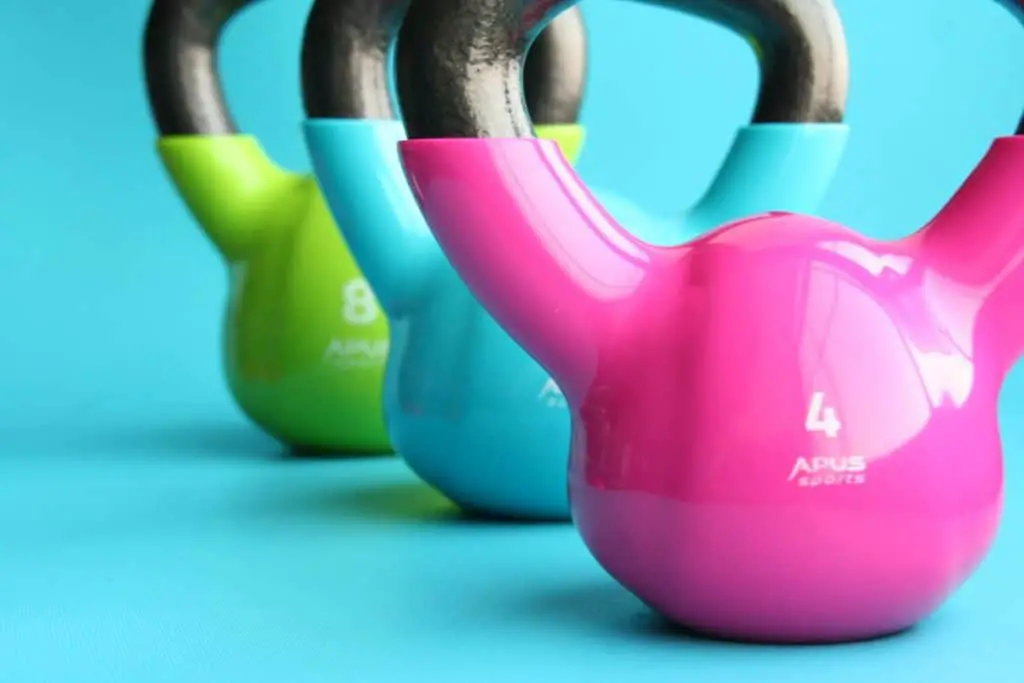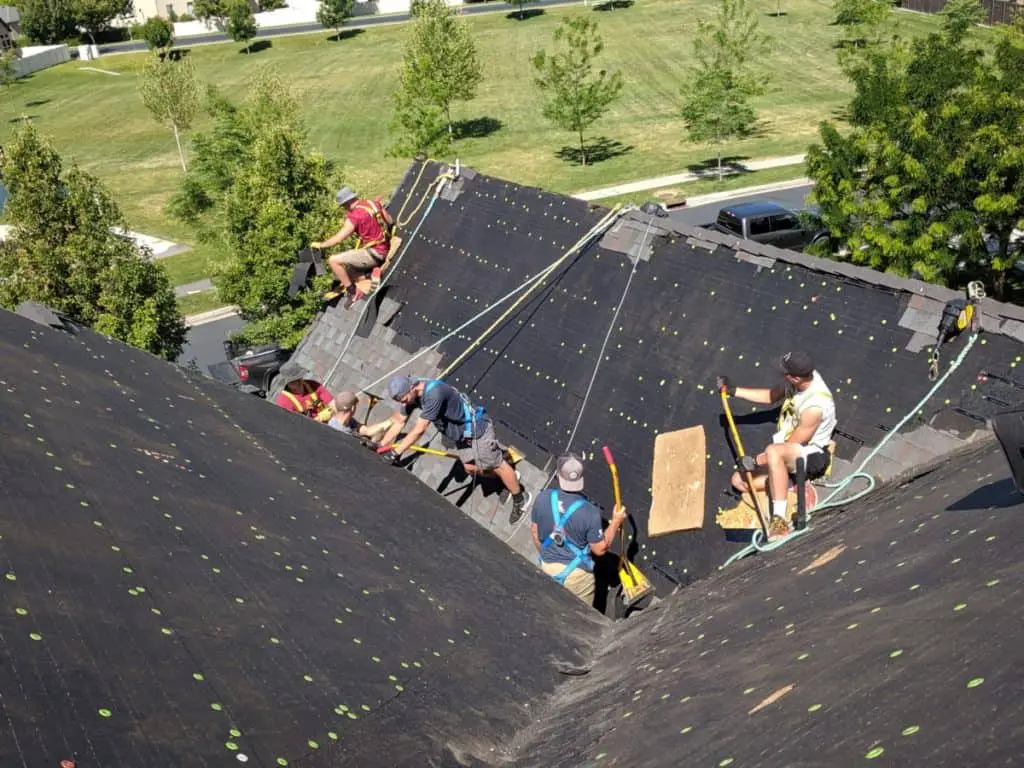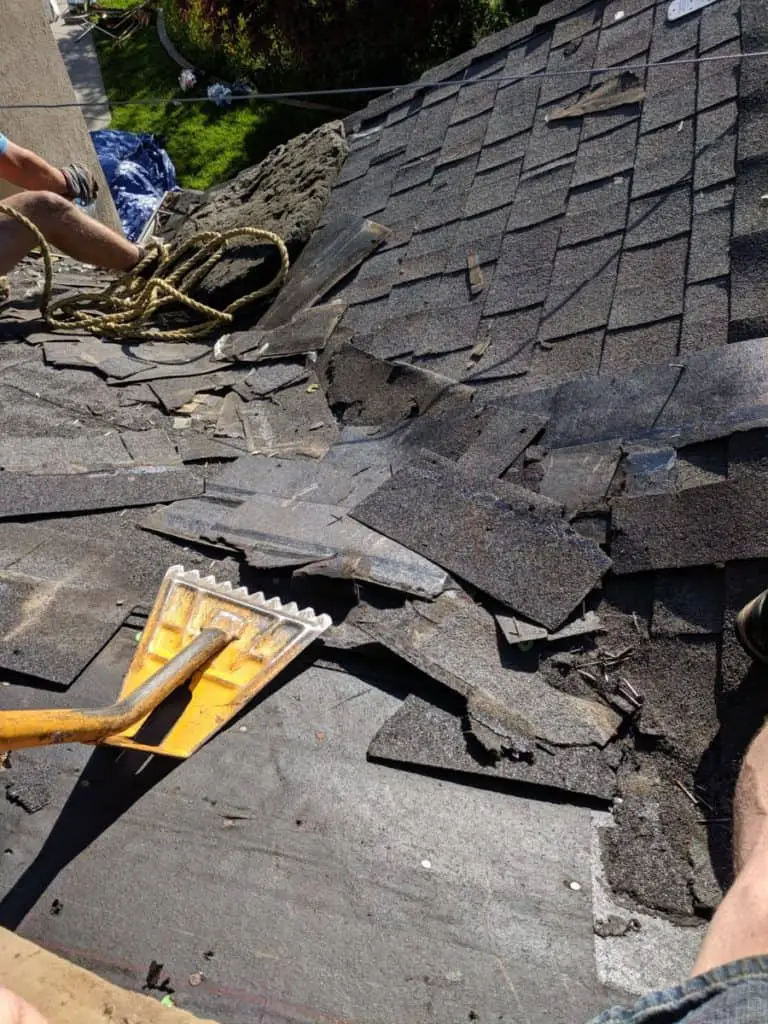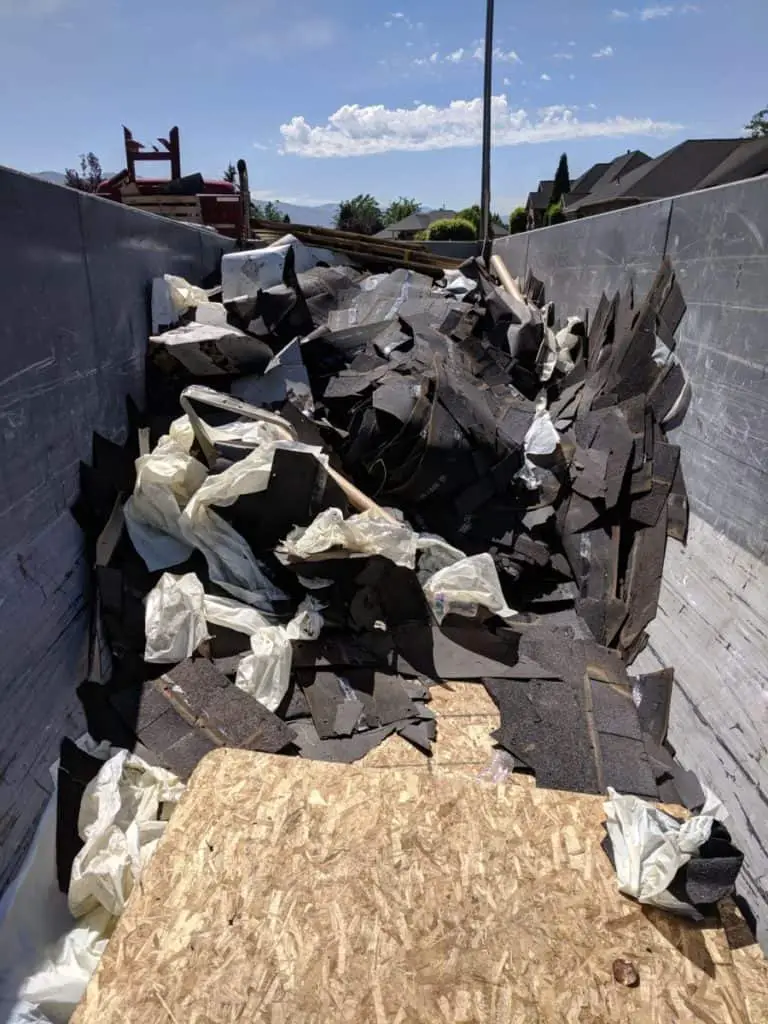
If you are considering roofing as your next job, you may be wondering what are the physical demands of the job are and will it give you good exercise.
Is roofing good exercise? Roofing can give you good exercise because it is a physically demanding job. Roofers frequently lift and move 50-80 lbs. for each bundle of shingles and may have to carry those bundles up ladders onto the rooftop.
But there are more physical activities in roofing besides carrying bundles of shingles up ladders.
The Physical Demands of Roofing

Each roofing company is different and has their own way of doing things. This information is based on my experience as a roofer. Other roofing companies will be a bit different and will vary depending on the type of shingles and the size of the roofing project.
As I previously stated, one of the most physical demands of roofing is carrying the bundles of shingles. Normally, the shingle supply companies will deliver the shingles and place them on top of the roof using a special truck with a conveyor belt.

However, sometimes the shingles can’t be placed on the roof and must be carried up on a ladder. In my experience, this doesn’t happen very often.
A roof usually takes about 3 bundles per 100 square feet, so if a roof is 2400 square feet that means it will need about 72 bundles of shingles.
Once the shingles are on the roof they often need to be moved around the roof to different slopes. This means roofers will frequently be moving those 50 – 80 lbs. bundles of shingles.
In addition to shingles, roofers need to carry rolls of felt underlayment up to the roof. Each roll can weigh about 30 lbs., and each roof will often need several rolls of felt.
Those are the main weights you will be handling when installing shingles. But before installing shingles you often have to tear off the old shingles.
Tearing off shingles involves using a tool called a shingle eater, this is a 7 lb metal tool used for ripping up shingles and pulling nails. This is a good cardio exercise, especially if you go fast.

After the shingles are torn off, they need to be cleaned up from the ground.
We typically shovel, or hand load the shingles into wheel barrels where they can be taken to the larger dumpster.
If the dumpster door can’t be opened, then we lift the wheel barrels above our heads over the edge of the large dumpster. This movement is similar to doing a “clean and jerk” at the gym.

Lastly, rooftops can be steep. As a roofer, you will be on your feet or kneeling all day.
I would compare walking on a roof to hiking up a mountain because you are always walking uphill or downhill.
I can definitely say that I have become stronger since I first started roofing. With that said, if you want to build muscle you should still go to the gym. Don’t use roofing as a substitute for gym exercise.
Reasons Why Roofing is a Great Job
Roofing is a physically demanding job, so why do people do it? Here are my reasons why I think roofing is a great job.
- Great Exercise: I enjoy the exercise that I get from roofing, it keeps me in shape and looking good for the ladies.
- Good Money: Depending on your cost of living will determine if you think the money is good. But the hourly pay rate can be anywhere from $15 an hour to $30 an hour depending on experience and knowledge.
According to the Bureau of Labor Statistics as of May 2018, a roofing contractor makes on average $19.23 per hour or $43,780 a year.
- Work Outdoors: It’s great being able to work outside, enjoying the fresh air rather than being cooped up in an office all day.
- Fun Co-Workers: As with any job, your co-workers can make a big difference in your job satisfaction. I feel a brotherly bond with the guys I work with. You can get some good conversations going and really get to know the people you work with.
- Sense of Accomplishment: At the end of the day, you get a great feeling of accomplishment from a good day’s hard work.
- Respect: People respect hard workers. Usually, when I tell people what I do for work I get comments like “Wow, I could never do that” or “Dang, that’s hard work”. Roofing is a respectable job because of its good honest hard work.
- Learn a Good Skill: Learning how to roof is a great skill. The more skills you learn the more valuable you become. This technical knowledge may come in handy down the road when you need to fix a leak on your home or the roof of your family and friends.
- Grit: It builds mental and physical toughness which strengthens your character.
- Great Tanning Opportunity: If you are into tanning, then this is a good chance to take off your shirt and soak up those sun rays. Or if you’re like me, then it’s a great chance to use your favorite sunscreen.
- Free Lunch: Not every roofing company will do this, but it’s worth mentioning. Some companies will provide you with free lunch and/or snacks almost every workday.
The Downsides of Roofing
As with every type of job out there are things that you like and things that you don’t like. Here are some of the downsides of roofing.
- Working in the Heat: It gets hot working under the sun, that heat is magnified when you are laying down black asphalt shingles. To compensate for this, most roofing companies will work in the mornings or evenings when the sun is not at its brightest.
- Getting Dirty: To some, this is not a big deal, others may care about it more. Roofing can get dirty especially when you are tearing off old shingles. Your clothes and arms may get covered in the shingle sand while your hands can get dirty from tar.
- Fiberglass: One of the base components in the asphalt shingles is fiberglass. When you are tearing off shingles, fiberglass can get on your arms and legs. The fiberglass slivers can make your arms and legs really itchy. This usually only happens when tearing off shingles.
- Blisters: When you first start roofing, your hands and feet are prone to getting blisters. Give it some time and you will develop calluses which protect your hands from blisters.
- Potential Risks: The other downsides are the potential risks you face. Some risks include body injury from things like improper lifting, using knives, falling off the roof, etc.
There are things that you can do to minimize your potential risks for injury. Here are some tips you should know to help you while roofing.
6 Tips for Starting Out in Roofing
1. Attitude is Everything
Having a good attitude makes the world of a difference.
As René Descartes said, “I think therefore I am”. If you keep a good attitude and choose to be happy you will come to really enjoy roofing.
It is best to keep a good attitude and don’t complain. Complaining about your work doesn’t do anyone any good. If there is a problem, seek to fix it don’t just sit around and complain about it.
As part of having a good attitude, it helps me to treat each day as an exercise. By doing this I try and challenge myself to work harder and go faster.
This kind of attitude will help you to stand out above your co-workers and will lead to you getting future raises.
Other things you could do to have a good attitude is to compete with your co-workers for fun. One example of this would be racing to lay felt/shingles the fastest.
It also helps to listen to your favorite music, audiobook, or podcasts.
You can bring a speaker and share it with your co-workers, or you can use headphones. Either way can be fun.
2. Drink a lot of Water!
Working in the heat means you will sweat. Make sure you drink plenty of water so you don’t get heat stroke.
The daily water recommendation varies from person to person. Many people recommend 8 glasses a day. But it’s different for everyone, you know your own body. Just make sure to stay hydrated.
3. Sun Protection
In addition to staying hydrated, it’s important to protect yourself from sunburns and potential skin cancer.
I recommend wearing sunscreen and sun protective clothing like long sleeve shirts, pants, and sun hats.
I also like using this neck gaiter to keep cool and protect against the sun.
4. Fiber Glass Sliver Prevention
Its always a good idea to carry with you a pair of tweezers to pull out slivers that are caused by shingles, or wood.
Most fiberglass slivers will be too small to see or pull out with tweezers. One way of preventing fiberglass slivers is to wear long sleeve shirts and pants.
I understand if you don’t want to work under the sun in a long sleeve shirt.
If that’s the case, then another tip is for when you shower off at the end of the day.
That is, rinse yourself first in cold water without rubbing. This helps to close your skin pores and rinse off any loose fiberglass on your skin.
5. Prevent Blisters
If I feel a blister forming on my feet, I like to use Moleskin. Moleskin is like a padded bandage that protects the skin on your feet from rubbing. You can buy it at most local retail stores or you can check it out by clicking here.
If I have a blister forming on my hands, I usually will use athletic tape. I don’t like using moleskin for my hands because of the soft backing it has.
6. Don’t Stop Learning
Always look for ways to learn more don’t stop learning. Roofing is a useful skill that you are learning.
Not everyone will make the effort to teach you so you should ask the more experienced ones to teach you new things. Even when you have some experience under your belt.
Ask for help when you are unsure about something. It is better for you to ask for help, than to just try it and make a mistake that could lead to a leak down the road.
Do your best to go above and beyond expectations. Work hard and fast, but don’t cut corners. This will help you to gain favor among your superiors and can lead to a promotion.
Related Questions
Is roofing a good career? Roofing is a good career that lets you learn useful skills, get good exercise, and work outside. According to data collected in May 2018 by the Bureau of Labor Statistics, a roofing contractor makes on average $19.23 per hour or $43,780 a year.
How dangerous is roofing? Roofing was ranked as the 4th most dangerous job according to the Bureau of Labor Statistics in their 2015 report. About 40 fatalities occurred for every 100,000 full-time workers in that year. Most of those fatalities were caused by falling off the roof.
How old do you have to be to be a roofer? The Fair Labor Standards Act (FLSA) and youth employment regulations require that a person must be 18 years or older to work at any job which has been declared hazardous by the Secretary of Labor. This includes both residential and commercial roofing construction sites.
